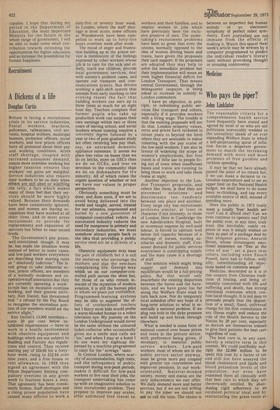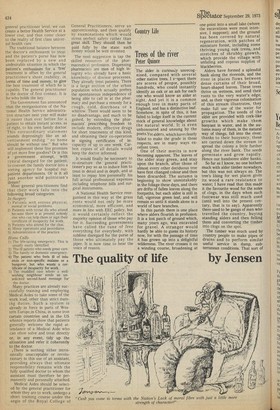Medicine
Who pays the piper?
John Linklater
The reasonable criteria for a comprehensive health service have frequently been stated and agreed by most of us who are not politicians irrevocably wedded to the unrealistic ideals of an ever expanding Welfare State in which a self-perpetuating spiral of inflation forces a desperate government to match the increasing demand with more and more promises of free goodies and reckless spending.
It may be that we have already passed the point of no return but, if we can make a decision to rationalise expenditure and to set an , upper limit on the National Health budget, we shall have to do some basic re-thinking, and tap every available source of skill, instead of spending more,
Does the public in 1973 really , want a totally 'free' health service? Can it afford one? Can We even continue to operate one? Did the public ever, at any time, truly want this inevitable, costly expense or was it simply wished on them as part of a package deal by that eloquent genius, Aneurin Bevan, whose intransigent emotional insistence on "free at the time of use " set a pace that others, including even Enoch Powell, have had to follow, willy nilly, notwithstanding all objections based on common sense?
Medicine, descended as it is in this country from Christian traditions of healing, and being ultimately concerned with life and suffering and death, has strong emotional overtones which confuse lucid thought. It is not easy to persuade people that the imposi• tion of a small, fixed, universal charge for the first consultation in any illness might well reduce the cost of the Health Service to the Nation by 20 per cent, especially as doctors are themselves trained. to give their patients the best care , regardless of cost.
The best care is, in any case, merely a relative term in this context. We could justifiably multiply the £2,000 million to be spent this year by a factor of ten and still not have assayed the blood cholesterol and lipids and blood potassium levels of the population, nor even have examined them all clinically with that best care to which they are theoretically entitled. By abandoning rigid adherence to an outdated political ideal and by restructuring the grass roots at , general practitioner level, we can create a better Health Service at a lower cost, and thus come closer to the reality of first class universal health care.
The traditional balance between the doctor's enthusiasm to treat and the patient's purse has now been replaced by a new and undesirable situation in which the patient's enthusiasm for a 'free' treatment is offset by the general practitioner's sheer inability, in terms of time and money, to give the best treatment of which he is capable. The general practitioner is the doctor of first contact. It is he who holds the key.
The Government has announced that the reorganisation of the National Health Service administrative structure next year will make it easier than ever before for a patient to obtain instant access, as of right, to his own family doctor. This extraordinary statement sounds depressingly like an advertisement ending " no home should be without one." But who will implement these fine promises of yet more free goodies? Or is this a government attempt, with cynical disregard for the patient, to convert the family doctor into a sorting agency for hospital outpatient departments. Or is it all just another wild politician's dream?
Most general practitioners find that their work falls into the following broad categories:
In Surgery
1) Patients with serious physical, mental or social problems.
2) Patients with trivial ills who attend because there is at present nobody else who can help them or sign their certificate of incapacity for work.
3) Patients who attend for the chat.
4) Minor operations and procedures.
5) Administration of the practice.
Home Calls
1) The life-saving emergency. This is usually easily identified.
2) The ill patient who needs great care.
3) The family or domestic emergency.
4) The patient who feels ill of inluenia or non-specific malaise or a hangover, but who wants a certificate of incapacity for work.
5) The muddled case where a wellwishing neighbour sends an unsolicited second-hand message for the doctor.
Many practices are already successfully training and employing Medical Aides to take some of the work load, other than strict nursing duties. Such a system is already in force in parts of Western Europe,in China, in some iron curtain countries and in the US whence reports show that patients generally welcome the rapid attendance of a Medical Aide who can often solve and treat directly or, in any event, tidy up the sitivation and refer it coherently to the doctor.
.There is nothing either intrinsincally unacceptable or revolutionary in this use of an assistant, providing always that ultimate responsibility remains with the fully qualified doctor to whom the assistant must therefore be permanently and personally attached. Medical Aides should be selected by the general practitioner for whom they are to work, undergo a short training course under the aegis of the Royal College of General Practitioners, serve an apprenticeship, and then qualify by examinations which would stress perfect safety rather than great skill. They should then be paid fully by the state: such money would be well invested.
The next suggestion is tap the skilled resources of the pharmaceutical profession. Dispensing pharmacists are men of high Integrity who already have a basic knowledge of disease processes. They already treat patients. There is a large section of the urban population which actually prefers the spontaneous independence of being able to call in at the pharmacy and purchase a remedy for a cough, cold, diarrhoea or a whitlow. There would seem to be no disadvantage, and much to be gained, by extending the pharmacists' prescribing freedom to include modern, effective drugs for short treatments of this kind, and obtaining their co-operation in signing certificates of incapacity of up to one week. Carbon copies of all details would keep the doctor informed.
It would finally be necessary to re-structure the general practitioner's pay so as to induce him to treat in detail and in depth, and at least to repay him personally his full actual professional expenses including telephone bills and surgical instruments.
A National Health Service reorganised in this way at the grass roots would not only be more economical, more efficient, and more in line with EEC policy, but it would certainly reflect the majority opinion of those who pay for it. Succeeding governments have called the tune of free everything for everybody, with sublime disregard for the purse of those who ultimately pay the piper. It is now time to hear the voice of reason.











































 Previous page
Previous page